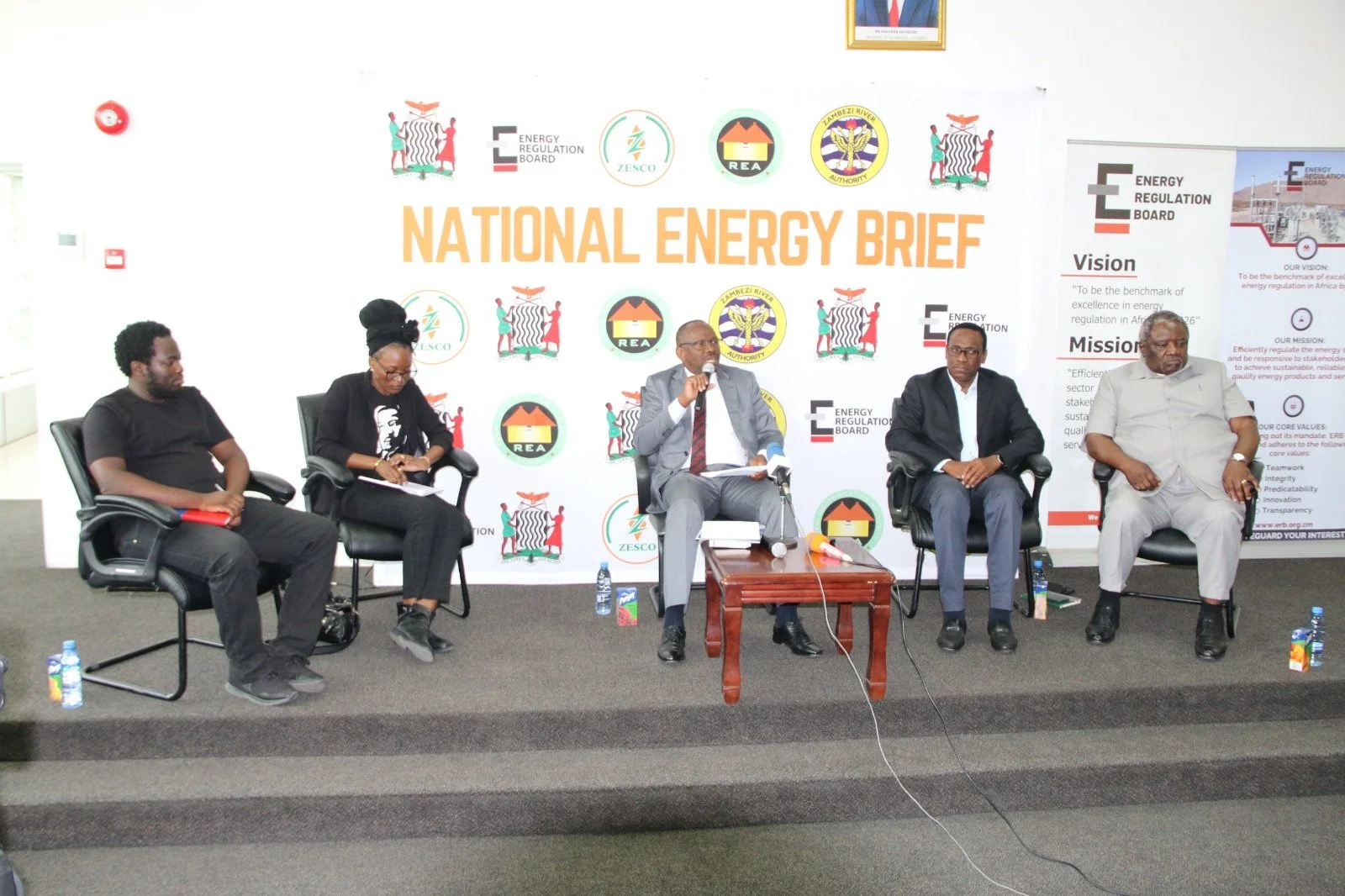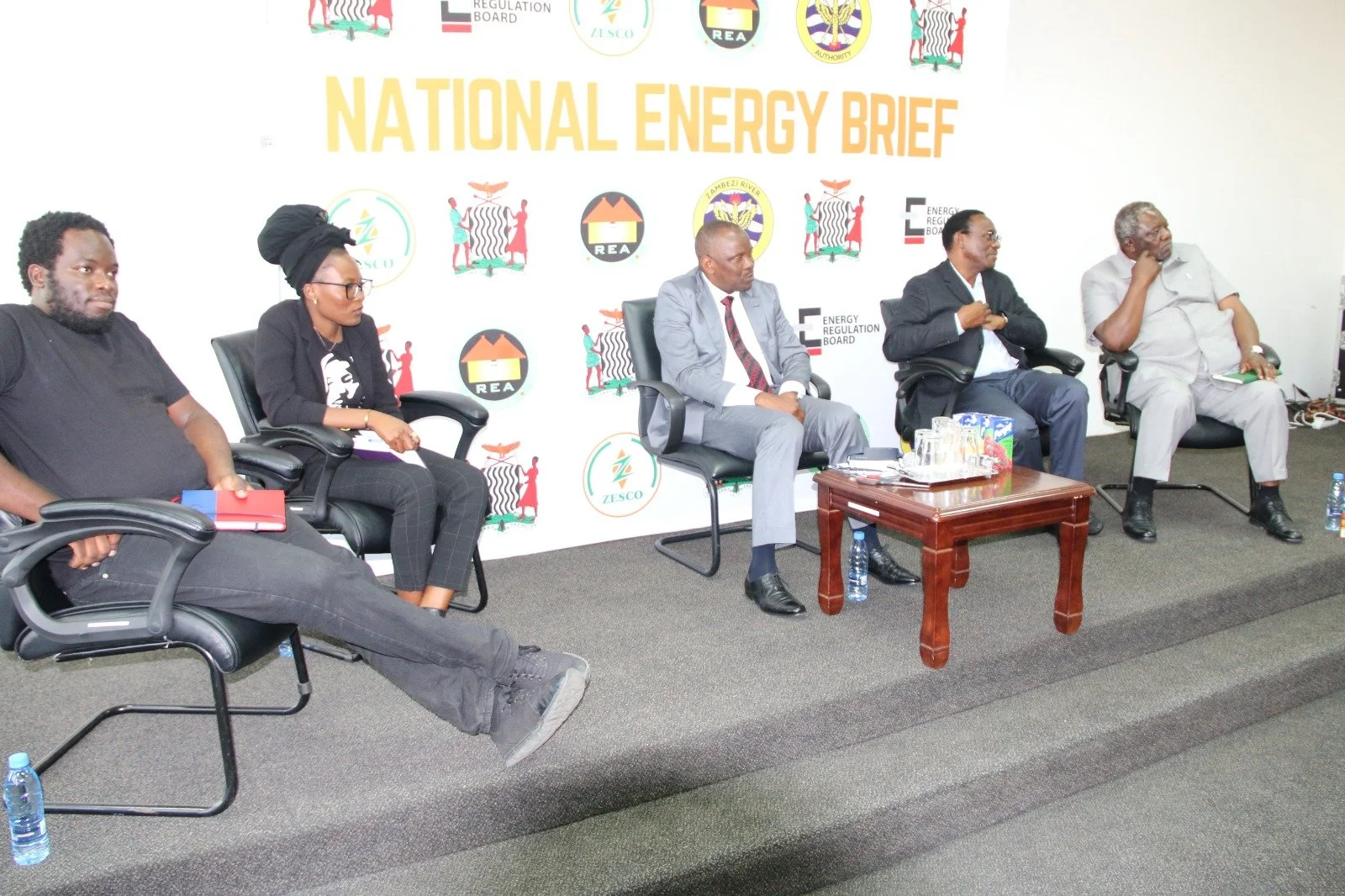Ministry of Energy Meets with Protestors over Power Rationing
(August 8 2024, Lusaka) The Ministry of Energy, in collaboration with ZESCO, the Energy Regulation Board and other key stakeholders in the energy sector, convened a meeting with representatives from the FixZesco protest campaign on August 8, 2024, to address ongoing concerns and complaints regarding the management of power rationing schedules.
This meeting was chaired by the Honourable Minister of Energy, Hon. Makozo Chikote, MP, and attended by senior representatives from ZESCO, ERB, industry stakeholders, and concerned citizens. The Ministry and ZESCO are grateful to the FixZESCO protest representatives for calling off their scheduled demonstration in order to attend.
KEY DISCUSSIONS AND OUTCOMES
1.Acknowledgment of Challenges
The Honourable Minister of Energy, on behalf of the Ministry and ZESCO, acknowledged the concerns raised by the public and various stakeholders
regarding the current power rationing schedules.
The Minister expressed his appreciation for citizens' patience and resilience during the ongoing energy crisis and reinforced government's commitment to ensuring a more reliable and transparent power supply system.
ZESCO officials updated stakeholders on the scale of the challenge, with domestic electricity generation falling to just 1,200MW - roughly half of national demand.
The utilityis mitigating the impact of this shortfall by importingan additional 455MW from neighbouring countries, including 255MW from South Africa. Total available power has therefore risen to 1,655MW, up from 1,565MW at the last ministerial update.
2. Assessment of Current Power Supply Situation
ZESCO provided an overview of the current power generation and distribution challenges.
This includes a reduction in current water levels at the Victoria Falls and Kariba North Bank power stations, the latter of which has seen its target generation fall from 151MW to 96MW due to a lack of water.
ZESCO also flagged other issues affecting the consistency of power supplies, including vandalism to electrical equipment, scheduled maintenance and fluctuating demand patterns.
The company highlighted disruptions to foreign electricity imports - such as maintenance work to Zimbabwe's grid on 30th June - which are outside of ZESCO's control.
ZESCO acknowledged that scheduled power disruptions (load shedding) are likely to increase in the short-term but reiterated its commitment to abiding by scheduled rationing schedules and to decreasing the levels of load shedding as soon as practicable.
3. Review of Power Rationing Schedules
A review of the existing power rationing schedules was discussed, with input from both ZESCO and external stakeholders. The meeting identified gaps in the current scheduling process, including inconsistent communication with consumers and a lack of real-time updates on power outages.
4. Immediate Action Plan
To address these issues, an immediate action plan was formulated, which includes the following measures:
Improved Communication: ZESCO will continue to enhance its communication channels to ensure timely and accurate dissemination of information regarding power rationing schedules. This wil include SMS alerts, social media updates, and dedicated customer service hotlines.
Revised Scheduling: A revised power rationing schedule wil be implemented within the next week, prioritizing critical services such as hospitals, water supply systems, and educational institutions with a possibility of increasing the power rationing hours to meet the demand
Stakeholder Engagement: Regular consultative meetings with key stakeholders will be established to ensure ongoing feedback and collaborative problem-solving.
Stakeholder Involvement: ZESCO wil continue educating stakeholders on ways to be energy efficient. The company urged stakeholders, including the FixZESCO protestors, to be ambassadors for the 'SWITCH TO SAVE' strategy. This includes:
SWITCH to gas for cooking at home.
SWITCH to solar energy for lighting and heating where possible.
SWITCH off electrical appliances that are not in use to save electricity and money.
Diesel Generators: ZESCO wil soon commence to installation of generators in strategic areas, such as hospitals, markets, and schools to improve reliability of supply.
5. Long-Term Strategic Initiatives
The meeting also discussed long-term strategies to stabilize the power supply, including:
Accelerating the development of alternative energy sources such as solar, wind, and biomass.
Exploring partnerships with private sector entities to diversify power generation capacity:
ERB has already reduced the approval time for power purchase agreements from 90 days to 48 hours.
From 1 August, ZESCO has introduced net metering: allowing electricity customers who generate excess power from solar installations to export that power back to the grid in exchange for a credit. This results in more energy being available for Zambian homes and businesses and diversifies the country's energy mix, making it more resilient.
6. Commitment to Accountability
The Ministry of Energy and ZESCO reaffirmed their commitment to accountability and transparency in the management of the country’s power supply. Both entities pledged to provide regular updates to the public on the progress of the implemented measures and to remain open to continued dialogue with stakeholders.
CONCLUSION
The meeting concluded with a shared commitment to improving the power rationing system in Zambia, with the immediate focus on minimising disruptions and ensuring that the public is well-informed. The Ministry of Energy, ZESCO, and stakeholders such as the Fix ZESCO Campaign will continue to work closely together to address these challenges and enhance the reliability of the national power grid.
In a statement, the representatives of the FixZESCO campaign said:
"We are pleased that this engagement has taken place, and we hope to continue to dialogue in this manner. We shall continue to offer checks and balances following their commitments today. We are hopeful that going forward we will have better communication and better adherence to the loadshedding schedules and more equitable distribution. We commit to assist in the crisis by switching and saving,"
Hon. Chikote issued a similar statement, saying
"Our discussions with the FixZESCO protestors today were very productive and I am grateful to the protest leaders for cancelling their planned demonstrations and coming to meet with us today. I understand the immense strain that the ongoing energy crisis is putting on Zambian citizens. I appreciate the representatives of FixZESCO for engaging with my Ministry to probe Government's strategy for tackling the crisis and I look forward to continuing our partnership.”
Jointly issued by:
Peter Mumba - Permanent Secretary, Ministry of Energy
Nawa Sitali - Concerned Citizen, FixZESCO Campaign





